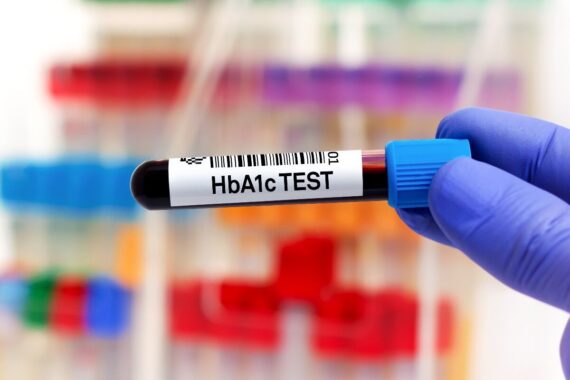Diabetes screening through HbA1c tests could pick up cases two years earlier, study suggests

Screening all 40-70-year-olds for diabetes using a HbA1c test would find undiagnosed cases of diabetes more than two years earlier, say researchers.
It follows an analysis of data from the UK Biobank study, where all participants had their HbA1c measured at enrolment but were not told of the results.
Using healthcare records from almost 180,000 participants, they excluded the 7.3% who already had a pre-existing diabetes diagnosis and among the rest found that 1,703 – or 1% – had undiagnosed diabetes.
The median time to clinical diagnosis for those with undiagnosed diabetes was 2.2 years, the researchers reported in Diabetologia, with a median HbA1c at clinical diagnosis of 58.2 mmol/mol (7.5%).
Ten years later, 88% had received a diagnosis, their analysis showed.
Women with lower HbA1c and BMI measurements at enrolment experienced the longest delay to clinical diagnosis, the study found.
The researchers from the University of Exeter said the potential for finding undiagnosed cases earlier could be even higher than the study suggests, because the UK Biobank population is healthier than the general population, and some ethnic minorities who have higher rates of diabetes were underrepresented in the cohort.
But they said rates of opportunistic diabetes testing grew during and after the study period which may mean that any screening initiative implemented today would provide less substantial benefits than the 2.2 year improvement seen in the study.
Rates of diabetes testing have been impacted by the Covid-19 pandemic which led to fewer HbA1c tests and delays in diagnosis of type 2 diabetes.
Currently in England, best guidance for carrying out the NHS Health Check for adults aged 40-74 years recommends testing for diabetes only in those found to be at ‘high risk’.
They concluded: ‘The cost-effectiveness of this population-wide screening of older adults merits further assessment and will vary based on the current levels of HbA1c testing in the underlying population.
‘Earlier diagnosis would allow earlier intervention with the potential to reduce the risk of diabetes complications, but this requires further evaluation.’
Study leader Dr Katie Young, a postdoctoral research associate, said: ‘Our study showed that the risk scores commonly used to determine who is at high risk don’t perform as well in those without obesity, so GPs should be aware of this.
‘In terms of how diabetes screening should be done in the UK, this is a little beyond the scope of our study. However, we hope our results help to inform any policy decisions on diabetes screening going forward by showing the benefit in terms of the reduction in time to diagnosis.’
Dr Becky Haines, a GP and clinical lead for diabetes in Gateshead said weighing up the harms and benefits from screening was complex.
‘The UK National Screening Committee last looked at screening for type 2 diabetes in 2019 and came to the conclusion that there was not strong enough evidence to support screening.
‘I think they review this decision every three years. [This study] shows that type 2 diabetes could be detected earlier from screening. I think the next step needs to be a randomised controlled trial looking at whether outcomes are improved from detecting type 2 diabetes earlier through screening.
‘Unless there is research to show that there are improved outcomes for the screened population, compared to usual care, it would not fit the criteria for a population screening programme.’
Pulse October survey
Take our July 2025 survey to potentially win £1.000 worth of tokens

Visit Pulse Reference for details on 140 symptoms, including easily searchable symptoms and categories, offering you a free platform to check symptoms and receive potential diagnoses during consultations.
Related Articles
READERS' COMMENTS [3]
Please note, only GPs are permitted to add comments to articles



 Oviva’s fully remote Tier 3 Weight Management programme
Oviva’s fully remote Tier 3 Weight Management programme







Quite interesting.
Good to see the researchers being explicit about the limitations: no data on any long term benefit of the earlier diagnosis; and balance of costs and benefits isn’t clear enough to propose a screening programme based on these findings.
Something for the (rather excellent) National Screening Committee to consider though.
2 years less of eating pork pies, beers and Macdonald’s without guilt? Consult big corporations first. They need diabetes, they share the investments in insulin don’t you know. Make you diabetic, obese and profit, give you a solution and also profit. Ace returns.
Thank you very much for sharing, I learned a lot from your article. Very cool. Thanks.